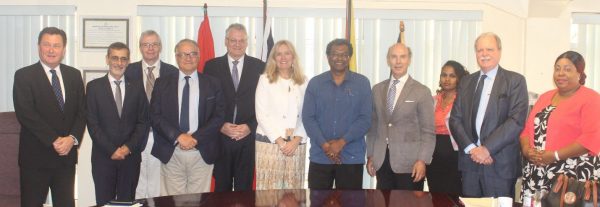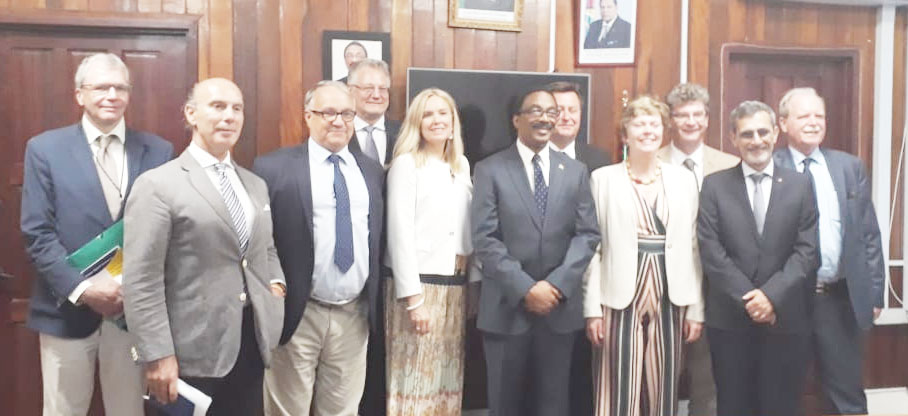A visiting delegation of European Union (EU) ambassadors yesterday began a series of planned engagements that will target ministers, the opposition and other key stakeholders and governance was among the issues on the agenda.
“From the legal context, we wanted to hear more and the Attorney General has given us a good overview of the situation and how he predicts things will be happening in the future,” Head of the EU Delegation to Guyana Jernej Videtič said shortly after a one-hour meeting with Attorney General Basil Williams had ended.
The non-resident ambassadors, who hail from Belgium, Finland, France, Germany, the Netherlands, Spain, Romania and Sweden, had earlier met with the Minister of Public Security Khemraj Ramjattan and there are more meetings planned with ministers today. UK High Commissioner to Guyana Greg Quinn was at the meeting with Williams.
Videtič, when asked if it was concern among the EU countries that sparked the meeting, said that it was “pure coincidence.” He informed that the planning of the trip began “a few months ago, not knowing what will be happening here.”
He disclosed, too, that “many” more meetings will be held in the coming days, including with Opposition Leader Bharrat Jagdeo. “We will go around and hear from many people and get informed of what is happening here,” he said.
Other EU officials held similar meetings earlier in the year.
Asked what conclusions the delegation drew from the meeting, he stressed the importance of good governance and that the principles of democracy are working and are respected. “This is what we heard and we are satisfied with what we heard,” he added.
Williams subsequently told reporters that the delegation wanted some insight into the state of things in relation to governance, with specific reference to the no-confidence motion case that is currently engaging the attention of the Caribbean Court of Justice (CCJ).
He said he updated the delegation and provided an overview of the prevailing situation in terms of the holding of elections as well as the issues raised in the courts thus far and the issues that will be before the CCJ.

The Ministry of Public Security, in a press release, said that a meeting with Ramjattan was aimed at furthering cooperation between Guyana and the EU. It noted that Ramjattan and the delegation discussed matters of governance and security issues in Guyana. “The cordial meeting touched on political stability and the positive economic expectation for Guyana. Minister Ramjattan reaffirmed that the Coalition Government is in full adherence to the rule of law, Guyana’s Constitution and good leadership,” the release said. The press was only notified of the meeting when the press release was disseminated.
On December 21st last, Speaker of the National Assembly Dr. Barton Scotland declared the opposition-sponsored no-confidence motion against the government passed following a `yes’ vote by then government parliamentarian Charrandass Persaud.
Government initially accepted the vote saying that it would act in accordance to the constitution but subsequently recanted, claiming that the vote was not validly passed as 34 voted were required and not 33.
Government wrote to the Speaker seeking to have the decision overturned. However, this did not happen and Scotland advised that remedy could be sought in the court.
Three court cases were subsequently filed – one by private citizen Compton Reid, one by the Attorney General on government’s behalf and the other by chartered accountant Christopher Ram.
On January 31st, Chief Justice (Ag) Roxane George-Wiltshire found that while Persaud was ineligible to be a member of the National Assembly by virtue of his foreign citizenship, his vote was valid; that 33 constituted a majority and that the passage of the motion should have triggered the immediate resignation of the Cabinet, including the President.
Those rulings were appealed and the Court of Appeal last month by way of majority disagreed with Justice George-Wiltshire on the majority needed, saying that 34 votes were required as a no-confidence vote needed an absolute majority in order to succeed. Several appeals are challenging this and other aspects of the Appeal Court’s judgment are currently before the Trinidad and Tobago-based CCJ. The court has already set timelines for the submission of written arguments and attorneys will be making oral arguments on May 10th.
Meanwhile, Ramjattan and the EU Ambassadors also discussed matters pertaining to crime and security.
According to the press release, security issues at the border with Venezuela were touched on.
Also the two sides discussed the EU Seaport Corporation Project (SEACOP) in the profiling of vessels and the conducting of safe and effective rummage operations in Guyana. It was explained that SEACOP supports Guyana by reinforcing capacities to combat illicit maritime trafficking and associated criminal networks and enhances international cooperation in tackling illicit maritime trafficking on the transatlantic cocaine route.
Additionally, the declining crime rate in Guyana which is supported by statistics from the Inter-American Development Bank’s Homicide Monitor for Latin America and the Caribbean was also discussed. The statistics indicate that the homicide rate for Guyana is 15 per 100,000 which is comparatively amongst the lowest in the region, the release said.
The release noted that Guyana’s relations with the EU, which were formalised with the signing of the Georgetown Agreement in 1975, are currently based on the Cotonou Agreement, the CARIFORUM-EU Economic Partnership Agreement and bi-regional political dialogue.





